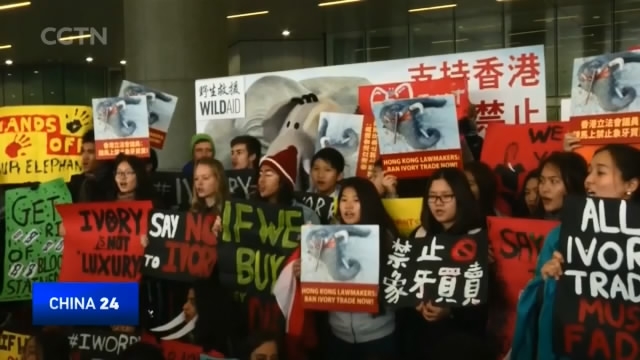
22:19, 02-Feb-2018
Hong Kong Ivory Ban: Region to ban trading by 2021

Legislators in Hong Kong have given their final approval to a proposal banning local ivory trading. Commercial sales of elephant tusks will be phased out by 2021 under a three-step plan. Natalie Pang has the details.
Another victory in the battle to save elephants. Just a month after the Chinese mainland's ivory ban took effect, Hong Kong has approved a ban on ivory sales in a landslide vote. As a gateway for both illegal and legal ivory imports into the Chinese mainland, the region's retail ivory market is considered as the world's biggest.
ELIZABETH QUAT LAWMAKER "Hong Kong has a very significant role, when I realised that Hong Kong is an international hub for black market ivory trade. I was shocked. Hong Kong is a financial hub, or air freight hub, I never knew that Hong Kong has such a bad name as black market ivory trade hub. I think Hong Kong cannot shun its responsibility in this."
The Hong Kong government is refusing to offer compensation to dozens of ivory shop owners and hundreds of licensed traders in the city. The region saw its biggest haul in three decades last July, when more than seven tons of tusks worth over nine million US dollars were seized. African ivory is highly sought after in China, and is considered a symbol of status by some. The demand for ivory is widely believed to cause the decline of Africa's elephant population. The number has dropped from 400-thousand, to merely just above a 100-thousand in the past decade.
MICHAEL LAU DIRECTOR,WETLANDS CONSERVATION WWF HONG KONG "This will show the commitment by Hong Kong government towards conserving the African elephants. What is needed next is to step up the enforcement to make sure there will no longer be any illegal trade into or through Hong Kong. And what we want to happen is that the commercial ban in the ivory trade will spread to other Asian countries."
Hong Kong's plan to wipe out the ivory trade by 2021 sends a message to the world: The beauty of ivory only exists when it graces a living elephant. Nathalie Pang , CGTN.

SITEMAP
Copyright © 2018 CGTN. Beijing ICP prepared NO.16065310-3
Copyright © 2018 CGTN. Beijing ICP prepared NO.16065310-3